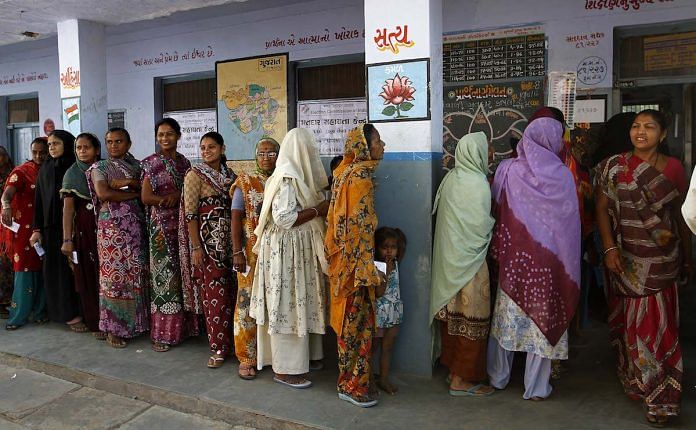89 constituencies across 19 districts covering Saurashtra, South Gujarat and Kutch regions of the state go to polls Saturday.
Ahmedabad/Bhuj (Gujarat): The first phase of the Gujarat assembly elections begins Saturday. Polling will be held in 89 constituencies across 19 districts covering Saurashtra, South Gujarat and Kutch regions of the state.
The state is broadly divided into four regions: Saurashtra or Kathiawar, North Gujarat, Central Gujarat and South Gujarat.
Saurashtra
Saurashtra has been a stronghold of the BJP, a region that has voted non-Congress even in the 1960s and 1970s. The region has stood with the BJP in 1995, 1998, 2002, 2007 and 2012. Of the 54 seats here, the BJP won 45 in 2012.
This time, however, the party was seen as being vulnerable in this region owing to a combination of factors such as the Patidar agitation, farm crises because of low prices of cotton and groundnut, as well as the adverse impact of GST and demonetisation on sectors like the
ceramic industry.
In its ground reportage, ThePrint found that GST and demonetisation will not hit the BJP electorally despite its impact on businesses. However, the Patel rebellion could be a cause of concern for the party.
The resentment among cotton and groundnut farmers who don’t get adequate prices for their produce is real, but that is not enough to turn them against BJP.
Chief minister Vijay Rupani is contesting from the Rajkot (West) seat in this region.
South Gujarat
South Gujarat is the tribal-dominated part of the state, the RSS and the BJP have attempted to work intensively.
The hub of this region, Surat — known for its textiles and diamond industries — witnessed significant anti-GST agitation as well as the Patel rebellion. This region has 33 constituencies.
ThePrint found that in Surat, the textile and diamond industries are still reeling under the after-effects of GST and traders are upset with the BJP for what they call ‘faulty implementation’ of this policy. However, many of them say they “have no option” and that the BJP will come back to power because of lack of a credible option. They, however, specify the Congress should come as a “stronger opposition to keep the BJP in check”.
Surat alone has 16 seats, of which BJP won 15 in the 2012 elections. This will be an acid test for the BJP to see if its urban vote-base is still intact and how much its demonetisation/GST gamble have harmed it.
In the tribal dominated Dang and Tapi districts, BJP does seem to have made important inroads. The tribal communities here have traditionally been with the Congress. Prominent tribal leaders from this region include Tushar Chaudhary from Congress and Ganpatsinh Vasava from the BJP.
Kutch
All six assembly seats in the Kutch district with 14.28 lakh voters will go to polls in Saturday’s first phase. Kutch is a BJP stronghold with the party currently having its legislators in five of the six seats — Bhuj, Mandvi, Anjar, Rapar and Gandhidham. The Congress holds the sixth seat of Abdasa.
The Kutch district has a significant Muslim population, 20 per cent, especially in the Mandvi, Abdasa and Bhuj constituencies. The Congress is trying to make inroads into the region and has been highlighting issues such as water scarcity and unemployment despite massive industrialisation, but the BJP is confident of holding on to its traditional vote-bank on its development agenda and the rapid restoration after the 2001 earthquake.
Among the big contests in this district, Congress’ Shaktisinh Gohil is trying to wrest control of the Mandvi seat from the BJP’s Virendrasinh Jadeja. The fight is likely to be intense with the Mandvi constituency having a significant Dalit vote share and a Muslim population of over 30 per cent.
The Bhuj constituency is also likely to see a fierce battle between BJP’s Neemaben Acharya, sitting legislator, and Congress’ Adam Chaki, known for having filed several public interest litigations alleging graft in the BJP-led state government.
The Gujarat assembly has 182 seats, of which the BJP had won 116 and the Congress 60 in the 2012 elections.



